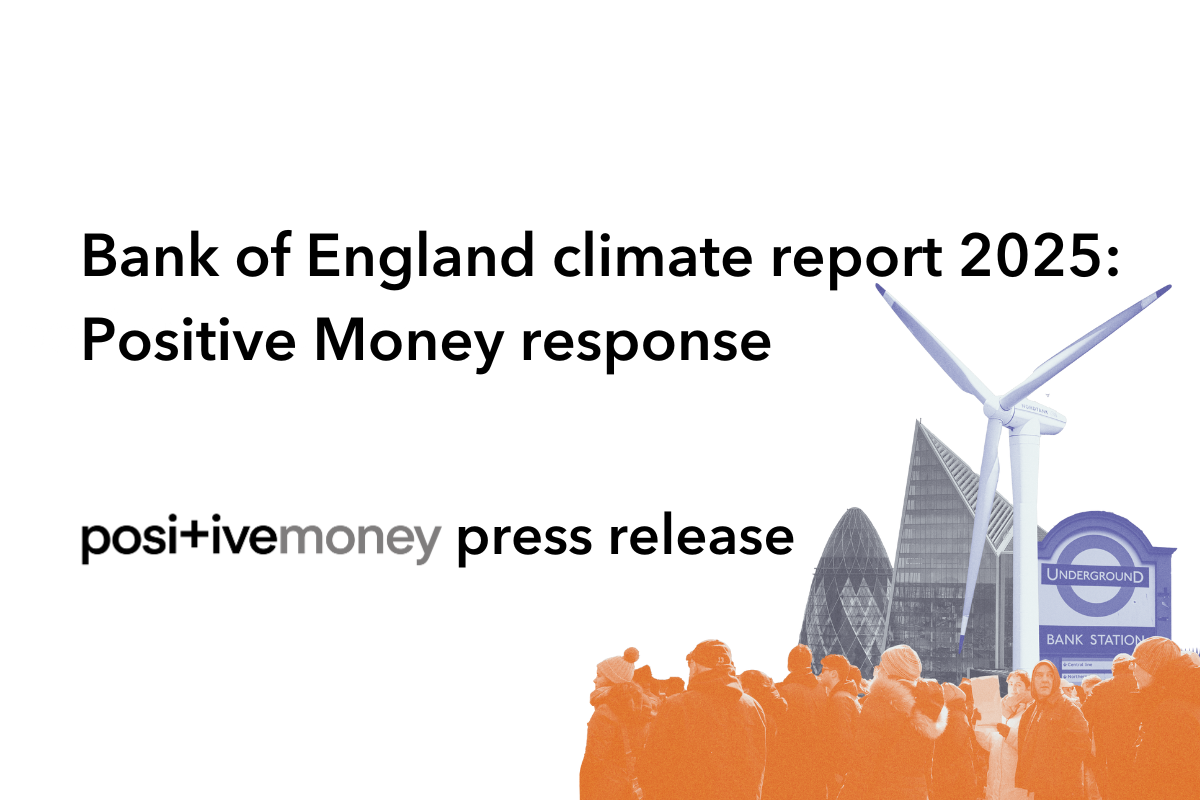
Green FinanceUK
26 June 2025
LONDON, 18th March 2024 – Today over 50 leading economists and civil society voices have written to Andrew Bailey, Governor of the Bank of England, calling for the Bank to step up its work to align the financial sector with climate goals as a matter of urgency.
Marking Bailey’s fourth anniversary as governor of the Bank of England, and coming shortly after the three year anniversary of the Bank’s Monetary Policy Committee being awarded a green mandate, the letter urges Bailey to urgently re-prioritise work to align the financial sector with the government’s climate goals.
Signatories include economists Ann Pettifor and Jason Hickel, author George Monbiot, former IPCC lead author and ecological economist Julia Steinberger, author and former chair of the UK Sustainable Development Commission Jonathon Porritt, as well as leading civil society organisations including Greenpeace, Green Alliance, WWF, the New Economics Foundation, and industry coalition Bankers for Net Zero.
The letter states that despite early progress on climate change including greening the Corporate Bond Purchase Scheme, the inclusion of climate-related conditions for the Energy Markets Financing Scheme, and the Bank’s climate-related financial disclosures, the Bank of England is now slipping behind other major central banks on this agenda.
Speaking before the Lords Economic Affairs Committee, the Governor recently confirmed that the Bank has reduced its resourcing of climate change work. This follows the Treasury’s removal of its goal to “align private sector financial flows with environmentally sustainable and resilient growth” from its list of priorities for the financial services sector, in a letter to the Bank’s Financial Policy Committee in November last year.
Signatories contend that the Treasury’s letter change does not warrant a de-prioritising of climate work. They highlight that climate change falls squarely within the Bank’s mandate for financial stability, given the significant risks it poses to the economy and asset values, and that supporting the transition to net zero remains as a secondary objective of the Monetary Policy Committee.
They also emphasise that climate change and environmental degradation more widely presents a major risk to the Bank’s duty to maintain price stability, as demonstrated by the recent period of global supply-side driven inflation, which Positive Money elaborates on in its recent report, ‘Inflation as an Ecological Phenomenon.’
The letter gained press coverage in The Mirror, Independent, The Standard, as well as Business Green and Edie.
Notes
The full letter is available here: https://positivemoney.org/wp-content/uploads/Letter-to-Andrew-Bailey-1.pdf
Positive Money’s report, ‘Inflation as an Ecological Phenomenon’, outlines the importance of climate change to price stability: https://positivemoney.org/publications/inflation-as-an-ecological-phenomenon/
In January 2024, 21 UK Asset Managers wrote to the Bank of England calling for further work to ensure regulatory capital requirements better reflect climate risks: https://greencentralbanking.com/2024/02/12/uk-climate-regulations-bank-of-england/
The biggest 5 UK banks have financed £329 billion (US$418 billion) into fossil fuels since the signing of the Paris Agreement in November 2015. Banking on climate chaos, Fossil Fuel Finance Report 2023: https://www.bankingonclimatechaos.org/
In 2020, over 100 leading experts wrote to Andrew Bailey, urging him to align the financial sector with the green transition: https://positivemoney.org/wp-content/uploads/2020/03/Open-letter-to-Andrew-Bailey.pdf
In February 2024, speaking before the House of Lords Economic Affairs Committee, Andrew Bailey said that the Bank has tried to ‘slim down’ work on climate change, following the removal of the government’s objective to ‘align private sector financial flows with environmentally sustainable and resilient growth’ from it’s list of priorities for the financial services sector in Autumn 2023. Bailey confirmed, however, that climate change remains within the FPC’s primary mandate for financial stability. The MPC’s secondary mandate still includes ‘increasing long-term energy security and delivering Net Zero’.: https://www.ft.com/content/292e7954-19f2-4907-9625-e6e0cf90c5a5
For more information or to arrange a briefing/interview with a spokesperson, please contact press@positivemoney.org.uk or Chloe Musto on 07724980666
